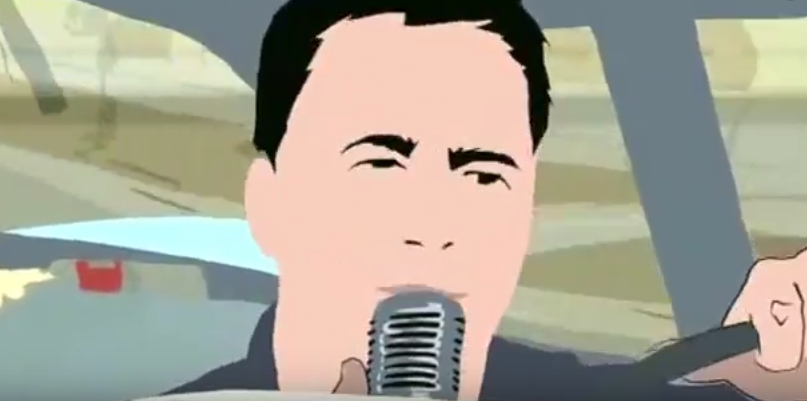Mainstream awareness of Breitbart, Infowars and other unsavory conservative “news” outlets has skyrocketed, as millions suddenly found themselves needing to know who Steve Bannon et al. were. For me, none of these outlets or talking points were news: I’m Texas born-and-raised — there, free-floating libertarian paranoia is a standard component of the mental backdrop. In high school I’d listen to Alex Jones on late night talk radio warn that black helicopters were hovering over central Texas waiting to take us all to the concentration camps. It wasn’t at all surprising that he was in Richard Linklater’s Waking Life and A Scanner Darkly. They’re Austin movies; why wouldn’t he be?
Jones was on FM station KJFK through 1999, when he predictably went Too Far with his (their words) “inside-terror-job-stuff.” That turned out to be a fortunate development for Jones, who could now position himself as a free voice shut down by the powers that be, giving credibility to the launch of his Infowars platform. The year before, he’d made his debut as a director with the DTV documentary America: Destroyed by Design, which focused on the usual suspects (the U.N., the Council on Trilateral Relations, the Bilderbergers et al.); Linklater saw it and cast Jones in 2001’s Waking Life. The West Texas-born Linklater is a self-identified libertarian who put a Ron Paul sign into Slacker, so it’s not surprising that he’d stumble onto Jones, who exemplifies the spirit of an area where you can pick up a Lyndon LaRouche newsletter at Whole Foods. Austin has a reputation as a cozy liberal college town, but it’s still part of Texas, and ambient libertarianism is a constant. Jones’ appearance in Linklater’s films is entirely in keeping with his then-normalized local celebrity presence: He used to curate a small shelf of conspiracy theory docs at locally beloved video store I Luv Video and in 2007 screened his work at the Alamo Drafthouse South.
In Waking Life, Jones drives around downtown Austin ranting through a bullhorn. The Fight-The-Man sentiments are very much in line with a career he’s spent screaming about how now he’s he’s not gonna take it anymore. “We’re gonna stand up, and we’re gonna be human beings,” he shouts. “We’re going to get fired up about the real things, the things that matter: creativity and the dynamic human spirit that refuses to submit.” With the black helicopters stripped from his talking points, Jones doesn’t sound that unsympathetic, just another anarcho-libertarian with too much time on his hands doing his coffee-shop spiel while cruising through the city. That’s very much Waking Life’s vibe, since the movie is at heart a college town bullshit session: the macho paranoia around the edges is the Texas touch.
Jones’ segment comes after the return of Slacker’s hitchhiker, now an angry prisoner vowing vengeance at everyone when he gets out, and precedes a segment in which Steven Prince (of American Boy and Taxi Driver arms dealer fame) tells a story about having to use a gun once to save his life. Having made the moral clear, he salutes the 2nd Amendment with his bartender, and then the two shoot each other dead. If all this seems violently out of place in a movie that’s mostly explicitly about Larger Philosophical Concerns, that’s Texas.
Jones’ briefer appearance in 2006’s A Scanner Darkly is more disturbingly heroic. Linklater’s Philip K. Dick adaptation stars Keanu Reeves as a government agent who slowly realizes he’s working for the bad guys. A moment of awakening comes walking down the street, when he sees Jones ranting through a bullhorn before a van pulls up and government goons toss him in the back. It’s a near-future dystopian sci-fi scenario, but it plays like a vindication of Jones’ ideas: Give it a few years, and all his dark prophecies will be vindicated. Jones certainly thought so: Talking up the movie on his show in 2006, he noted that “I know the people involved in [the film]. They understand the New World Order. They understand what’s going on.”
Linklater’s career-long idea that we all benefit from talking to each other, even if we don’t always agree, is severely stress-tested by this inclusion: Fifteen years on, Jones isn’t just another innocuous voice but someone who claims to have Our 45th President’s Ear, a conspiracy outlet with a seat at the daily White House press briefings. Unlike Jones, Linklater doesn’t appear to have gone that far at any point: He was never a 9/11 truther (“I don’t think our government is that competent,” he told The Washington Times in 2006) and, distancing himself from Jones, said: “I’ve always been interested in the conspiracist. Not that I think it’s true.” But a vampire can’t enter your house unless you invite it in, and the same principle applies here: Give someone a platform because he or she seems harmless enough, and you have to own the consequences.
Support Us
Houston's independent source of
local news and culture
account
- Welcome,
Insider - Login
- My Account
- My Newsletters
- Contribute
- Contact Us
The InfoWars Hit Austin: Alex Jones in Richard Linklater's Waking Life and A Scanner Darkly

via screengrab
Jones in Waking Life, getting the truth out any way he can.
[
{
"name": "Related Stories / Support Us Combo",
"component": "11591218",
"insertPoint": "4",
"requiredCountToDisplay": "4"
},{
"name": "Air - Billboard - Inline Content",
"component": "11591214",
"insertPoint": "2/3",
"requiredCountToDisplay": "7"
},{
"name": "R1 - Beta - Mobile Only",
"component": "12287027",
"insertPoint": "8",
"requiredCountToDisplay": "8"
},{
"name": "Air - MediumRectangle - Inline Content - Mobile Display Size 2",
"component": "11591215",
"insertPoint": "12",
"requiredCountToDisplay": "12"
},{
"name": "Air - MediumRectangle - Inline Content - Mobile Display Size 2",
"component": "11591215",
"insertPoint": "4th",
"startingPoint": "16",
"requiredCountToDisplay": "12"
}
,{
"name": "RevContent - In Article",
"component": "12527128",
"insertPoint": "3/5",
"requiredCountToDisplay": "5"
}
]

